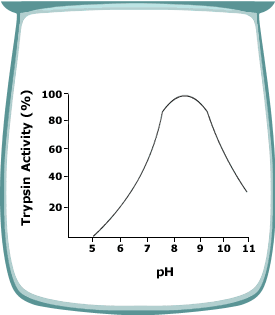

Food digestion continues, after the stomach, in the small intestine.
While the food coming from the stomach is acidic, secretions from the intestine wall neutralise this, making the material more alkaline.
So the digestive enzymes in the small intestine need to be able to operate best in alkaline conditions. And this is what you find.
For example, trypsin, which digests proteins, functions over a pH range of 5 to 10, and works best at a pH of 8 to 9.
